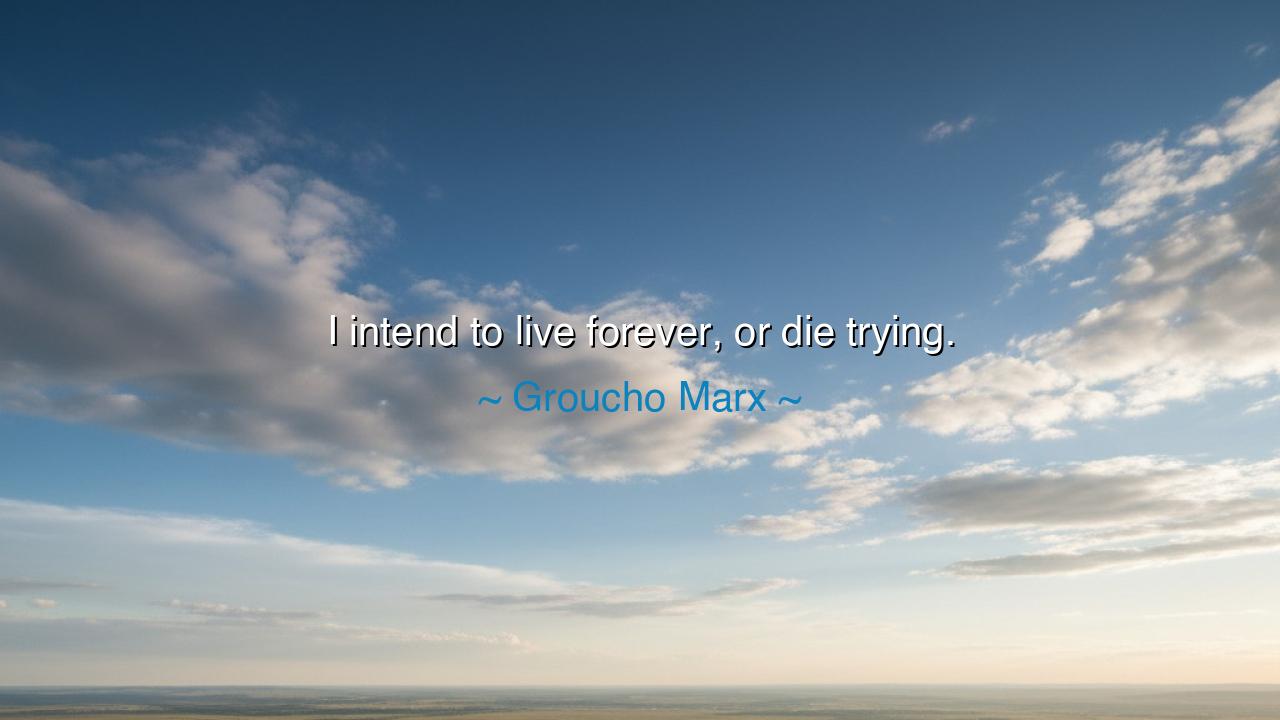
I intend to live forever, or die trying.






“I intend to live forever, or die trying.” Thus quipped Groucho Marx, the jester-philosopher of the twentieth century, whose humor often cloaked deep truths in laughter. At first hearing, his words seem playful—a joke tossed into the air like a feather. But beneath the jest lies a spark of ancient wisdom: the human longing for immortality, not through endless years of breath, but through the fire of spirit and the echo of meaning. Groucho’s wit was his sword, and in this line, he wields it with both laughter and defiance, declaring that life should be lived not cautiously, but vividly, until the very end.
Born in an age of vaudeville and war, Groucho understood that existence is fragile, absurd, and fleeting. His humor was his rebellion against despair, his laughter a way to turn mortality itself into mockery. When he said, “I intend to live forever, or die trying,” he was not promising literal immortality—he was promising to live so fully, so outrageously, that death would find him already immortal in spirit. He spoke the creed of those who refuse to merely exist; who choose instead to burn brightly, leaving behind a light that endures after they are gone.
The ancients, though clothed in the gravity of their times, shared this same impulse. The Greek hero Achilles, when offered a choice between a long, quiet life or a short, glorious one, chose the latter. He knew that the measure of a man’s life is not in its length, but in its intensity of purpose. Achilles sought immortality not through years, but through legend. So too does Groucho’s jest echo the same heroic spirit—the belief that laughter, courage, and passion can carve one’s name into eternity. One might say that Groucho, like Achilles, understood that to “die trying” is no failure, but the only honorable way to live.
History is filled with those who lived by this creed. Leonardo da Vinci, tireless seeker of knowledge, once wrote, “As a well-spent day brings happy sleep, so a life well used brings happy death.” He, too, “died trying”—trying to capture the movement of flight, the mystery of the human form, the divine in art. Though centuries have passed, his works remain alive, his spirit forever whispering through the corridors of creation. Such is the eternity of endeavor: when one’s efforts are born of love, curiosity, or vision, death cannot silence them.
Groucho’s humor transforms this same truth into lightness. He reminds us that the pursuit of meaning need not be solemn; that laughter is itself a form of immortality. To live forever, in his sense, is to live joyfully, boldly, without apology. It is to embrace the absurdity of existence with grace, to love and laugh as though each day were both the first and the last. He teaches that to “die trying” is not to fail, but to persevere in the art of living—to continue creating, joking, loving, and daring until life itself relents.
There is, too, a moral lesson hidden in his mirth. Groucho’s words whisper against complacency. They mock the soul that drifts, content with mediocrity, waiting passively for time to pass. Life, he reminds us, is not a vessel to be preserved but a flame to be kindled. Those who wish to “live forever” must do so through deeds and laughter, through acts of courage and generosity, through the mark they leave upon hearts and history. For when the body fades, only the radiance of the soul’s expression remains.
The meaning of Groucho’s quote, therefore, is both comic and profound. It celebrates the paradox of mortality—that we cannot escape death, but we can defy it through vitality. The wise do not fear their end; they fear only the life unlived. To “die trying” is to live with purpose so fierce that even failure becomes triumph. The one who loves deeply, dreams greatly, and dares joyfully will not die in vain, for their essence will ripple onward—through memory, through art, through laughter that outlives their breath.
The lesson, my listener, is simple yet eternal: live as though you are already immortal. Pour yourself into every moment, not with fear of the end, but with reverence for the present. Laugh often. Create bravely. Love without hesitation. Do not cling to safety or delay your dreams, for time does not wait. Let your life be so rich in meaning that when death comes, it finds nothing left to take—only a legacy already immortal.
So remember the words of Groucho Marx, the clown who spoke like a sage: “I intend to live forever, or die trying.” Take them not as jest alone, but as a challenge. For the one who lives with passion and laughter, who greets each day as a chance to shine, will never truly die. They will continue—woven into stories, memories, and the laughter of generations yet to be born.






AAdministratorAdministrator
Welcome, honored guests. Please leave a comment, we will respond soon